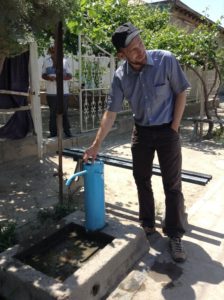ISW has been implementing rural water supply, hygiene and sanitation projects in Tajikistan and Uzbekistan, on behalf of SDC, since 2006. The participatory approach used by ISW has proven successful and was commended in two external evaluations undertaken in 2012.
Country:
Tajikistan
Project Period:
2014-2017
Name of Staff involved and functions performed:
Sean Furey: Team leader, water supply and water resources expert
Florian Klingel: Sanitation expert
Name of Client(s):
International Secretariat for Water (ISW) on behalf of the Swiss Agency for Development Cooperation (SDC)
Description of the Project:
ISW has been implementing rural water supply, hygiene and sanitation projects in Tajikistan and Uzbekistan, on behalf of SDC, since 2006. The participatory approach used by ISW has proven successful and was commended in two external evaluations undertaken in 2012. In this phase, the approach was rolled out to more communities in the the Ferghana Valley. Skat was asked by ISW to provide support in the areas that they felt needed strengthening, as a result of the evaluations. Advice was provided on integration with the on-going Integrated Water Resource Management (IWRM) processes and the adoption of Water Safety Planning (WSP), which the the World Health Organisation (WHO) had been piloting for small communities elsewhere in Tajikistan. However, the main area was sanitation and wastewater, in particular eco-san, which Skat has been successfully piloting in Moldova as part of the Apasan project.
Specific tasks carried out in the framework of this mandate are:
- Face-to-face meetings with key stakeholders in Tajikistan and observation of past and current ISW activitities in the Tajik Ferghana Valley.
- Providing coaching and remote support to project staff on:
- Design of EcoSan toilets in selected schools;
- Design of a wastewater treatment system for a hospital;
- Faecal sludge management.
- Making connections with other organisations and practitioners and drawing on a wider pool of expertise through the Rural Water Supply Network (RWSN).




